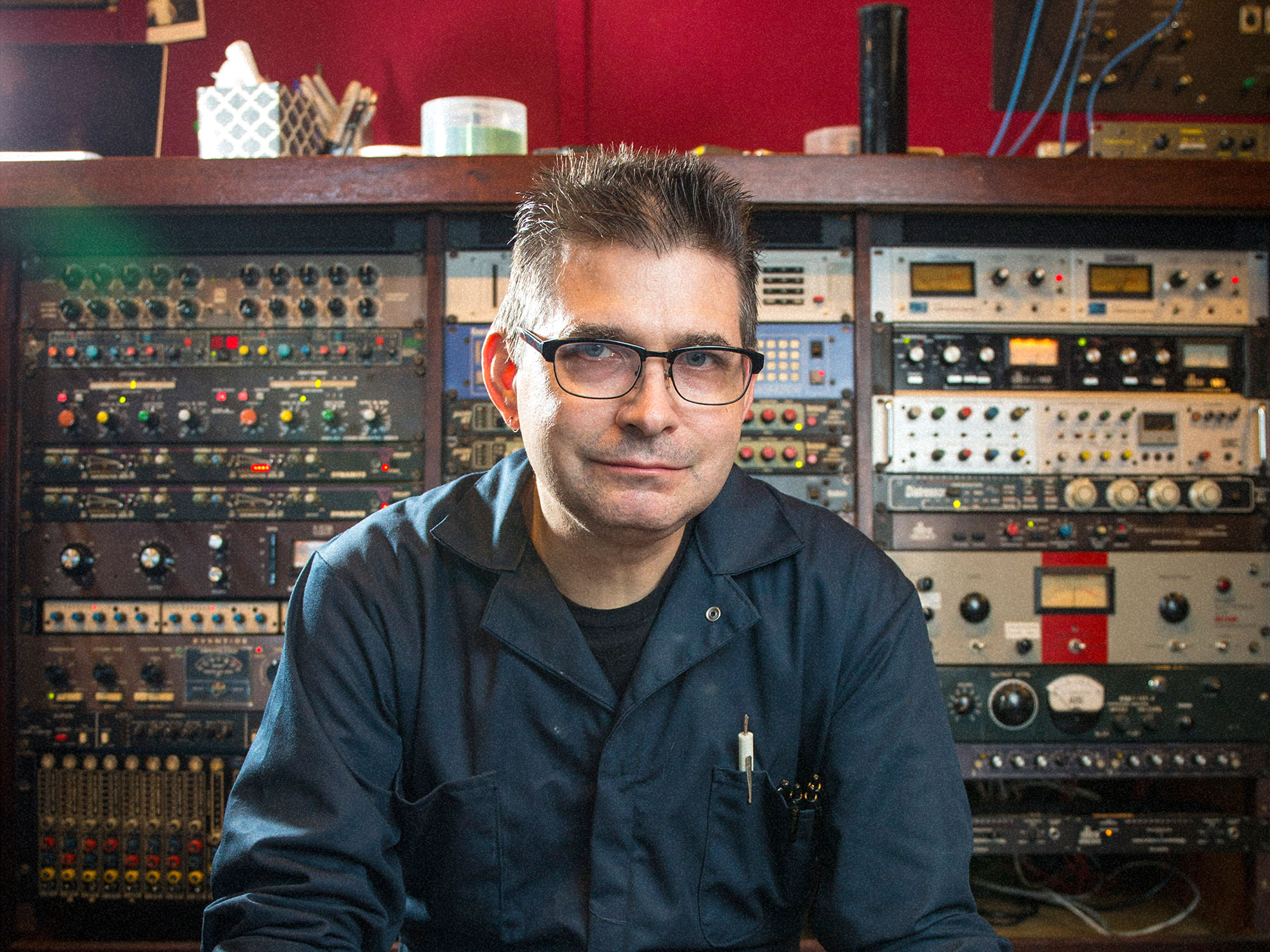Photo Credit: Unknown
“Hey man, I wanna have a fight with you/Regardless of my feelings on the subject/It appears that I am going to.” An acutely confrontational and self-aware thing to say, it almost sounds sardonic in its intent. Possibly the most apt description to the name of the late Steve Albini, and it’s even funnier because that’s his own line from Watch Song by his longest standing project, Shellac. For those who’ve heard his name before, surely it comes with a preconceived notion about the person behind it – often characterised as “controversial”, “difficult” and holding unconventional views, Albini’s name has become more synonymous to an idea about a person than the actual face who carries it. This was fueled by his bluntness and unapologetic demenaour in his early years, but his reasons are often skewed in the public eye.
Albini sprung into relevance in the early 1980s as the frontman of noise-rockers Big Black, earning a cult following among record store clerks and aggressive nerds for their intense sound and stark depictions of small-town malevolence. Big Black epitomized the DIY ethos: they organised their own tours, avoided contracts, didn’t hire a manager, never considered signing with a major label, and disbanded at the peak of their relative fame. They released two LPs, 1986’s Atomizer and a year later came the provocatively titled Songs About Fucking. Adding insult to the injury, Albini later led the short-lived project Rapeman, named after a Japanese manga character infamous for committing said act. There was the music, much of which was exceptionally good. However, in his public persona as Steve Albini, he frequently came across as the wiseass who believed he was smarter than everyone else and enjoyed provoking those who weren’t sharp enough to catch his drift.
1993 was the year Albini solidified his contentious image with his notorious essay, The Problem with Music, published in Chicago’s alt-magazine The Baffler. In it, he compared the struggle for musicians to secure a good record deal to swimming through a pool of “runny, decaying shit.” Albini’s stringent indie ethics polarised opinions: some agreed with his uncompromising stance, while others viewed it as ignorance. Many simply considered him a jerk. In 2002, Chunklet magazine’s cover featured a picture of Albini with the headline, “Is this the biggest asshole in rock?” Albini’s mother, Gina, remarked, “He’s always spoken his mind, and that’s probably got him into trouble sometimes.”
It’s easy to say that Albini’s youthful abrasiveness often crossed into outright belligerence, and therefore dismiss him and his work entirely. Despite the reputation that precedes him, however, Albini wasn’t a typecast-rockstar nor did he live his life like one – this being reinforced by the fact he wasn’t afraid to admit when he was wrong. In reality, Albini had little patience for those who were “careful not to say things that might offend certain people or do anything that might be misinterpreted,” viewing this as superficial goodness rather than genuine virtue. To him, it was straightforward: he believed that if people read his interviews or considered his music, they would understand his true politics. The overarching point was to change one’s way of living, not merely one’s way of speaking – yet he didn’t seem to grasp that, for those who don’t know your innermost thoughts, the way you speak is how you are perceived.
Over time, Albini’s perspective shifted. “I can’t defend any of it,” he admitted in a 2022 interview. “It was all coming from a privileged position of someone who would never have to suffer any of the hatred that’s embodied in any of that language.” For years, Albini believed his offensive remarks had solid artistic and political motivations. However, as he saw others in the scene who genuinely seemed to relish being crass and offensive, he began to reconsider. “That was the beginning of a sort of awakening in me,” he said. “When you realize that the dumbest person in the argument is on your side, that means you’re on the wrong side.”
Transitioning to work behind the mixing console allowed Albini to mature without compromising his unswerving principles. To quantify his impact on underground music would be a nearly impossible task, as is determining the exact number of records he worked on, through he once estimated it to be in the thousands. But as Albini has reiterated very clearly through the years, he was never a producer: “The producer is responsible for the artistic decisions and the management of the music, the artists and the recording. [In other words], the producer is ultimately responsible for all the decisions that are made in the making of the record, and I don’t do that,” he said in a 2015 masterclass. Notably, Albini criticised many so-called producers for their lack of technical knowledge. He believed an engineer should understand microphone capabilities, operate mastering decks, tune instruments, manage gain and distortion, and handle other technical aspects – requiring specific expertise and labour, which was exactly what he brought to the table.
To that end, Albini systematically maintained a straightforward music production process. This doesn’t mean he abandoned nuance and depth, but these elements had to be genuine and immediately impactful. Efficiency was crucial to his method, capturing the essence of the music without caveats. His approach can be distilled into a sacred trio of principles: simplicity, sincerity, and speed. At Electrical Audio, his recording studio in Chicago, Albini was known for his unique approach: on the first day, he would give artists a yellow legal pad and ask them to write down a description of every song they planned to record. The aim here was to prevent miscommunications and ensure that artists made the most of their studio time – a crucial component since many bands he worked with have had limited budgets, necessitating quick and efficient recording sessions.
Akin to the styles of John Loder and Iain Burgess, Albini’s expert studio knowledge allowed him to record bands performing together in the same room, with carefully placed microphones capturing the sound of instruments and amplifiers. He avoided excessive overdubbing, processing, and click tracks and relied on his ability to maximise equipment potential without making it the focal point. This process comes at odds with the slower pace of working in the digital domain, where software unfamiliarity often leads to trial and error, and reliance on computer functionality – just one reason why he was a staunch supporter of analog recording technology. Albini has always maintained that experienced record makers understand the importance of recording sounds correctly from the start, as post-recording manipulation is never as effective. His own exercise in precision thus allowed him to record and mix everything within an average of four to ten days – in his own words: “If a record takes more than a week to make, somebody’s fucking up.”
Naturally, in order for such a method to bear fruit, it demanded excellent musicianship under unembellished conditions from both himself and the band he recorded – his responsibility being to capture the most accurate representation of said artist on tape, and not to superimpose his own ideas on their music. Several bands have noted that during their recording sessions, Albini could be seen reading a book or playing Scrabble. Albini explained that this approach helped keep his senses sharp and broadened his perspective. “When I first started making records, I would sit in front of the console concentrating on the music every second. I found out the hard way that I tended to fiddle with things unnecessarily and records ended up sounding tweaked and weird. I developed a couple of techniques to avoid this,” he explained in a Reddit AMA. “This has proven to be a really good threshold, so that if anything sounds weird or someone says something you immediately give it your full attention, and your concentration hasn’t been ruined by staring at the speakers and straining all day.”
What made this approach ultimately special was the unabashed truth and authenticity it brought to the music. Small human errors were noticeable, and the albums often had a spatial quality, making the room where the band played audible. David Lovering’s drum riff creates space for the subsequent instruments in the intro to the Pixies’ Bone Machine, and by the time Black Francis enters, it sounds like he is shouting from the back of the room. This informal arrangement of instruments and vocals conveyed a sense of tangible realism, as if the listener were in the same room with the band. “I’ve always strived for naturalism. I’m not saying it’s like photographic realism, but I like the idea that the playback of a recording should evoke the sense memory of having seen that person play,” Albini explained in a 2020 interview. Over time, hiring Albini became a statement for artists wanting to sound more “real” and convey a sense of honesty and purity, especially if they were on a major label. “To me, he was the king of the underground,” says Gavin Rossdale, frontman of Bush, whose 1996 album Razorblade Suitcase was produced by yours truly.
His work was fuelled by frustration with polite society’s taming and neutering of genuine expression. Despite his aversion to being called a “producer,” Albini had an almost metaphysical understanding of the humanity in recorded music. He was dedicated to preserving the purity of music, resisting corporate influence and technological overreach. He also despised record labels, especially major ones, and preferred to be paid a flat fee for his work, avoiding points or percentages. This approach attracted numerous bands to Albini’s studio, seeking his endorsement. His letter to Nirvana, recently widely circulated, reads like a succinct ransom note filled with the bitterness of a manifesto. It’s crucial to remember that despite their sudden fame, it was Nirvana who approached him to record the follow-up to the now ubiquitous Nevermind. Recognising the implicit hierarchy, Albini flipped the script from the start—not out of animosity toward the band, as he has fondly recalled working with Kurt Cobain, Dave Grohl, and Krist Novoselic – but from his principled opposition to corporate music labels and their exploitative practices. Notably, he took no percentage of the royalties from 1993’s In Utero, likening himself to a “plumber” with a job to do – despite practicing reductionism in his later life, Albini never abandoned his scatological humour.
Beneath this self-characterisation was a deeper philosophy about the world and how it should operate. Albini never systematically outlined his views, but he frequently expressed anti-corporatist sentiments, highlighting capitalism’s brutality toward individual artists. He saw himself as a worker, and viewed musicians as fellow workers who should not be alienated from the fruits of their labour. Rejecting royalties was a key part of his ethical stance against corporate exploitation, which routinely destroyed artistic careers while bankrolling outdated musicians and bands past their prime. Occasionally, he even left his name off the credits entirely or used a pseudonym – for Jawbreaker’s seminal 1994 release, 24 Hour Revenge Therapy, he’s credited as Fluss, the name of his cat. One needs to remember that Albini’s comprehensive experience with the recording industry’s opportunities and systemic inequalities is what shaped his artist-centred approach. So next time you’re quick to construe the persona as the person, just ask yourselves, who labelled him such a nuisance – was it the suits that wanted a streamlined music business model that favoured themselves, or was it the countless artists that Albini selflessly facilitated towards?
Albini held everyone, including himself, to high standards, emphasising vocational excellence whether in music performance or mixing. The countless albums he worked on form an intergenerational archive, a lasting source of artistic and intellectual inspiration. To him, his responsibility was always clear: “This might sound a bit big-headed of me, but I feel my job is being a vector of history. I’m making recordings which are gonna sit on a shelf, and then at some distant time are gonna be discovered again. Making a permanent record, I take that aspect of it very seriously. I want the music to outlive us all.” Understanding how he managed to do just that, unlocks the indelible significance of his work in the counterculture. As Jeremy Gordon wrote for the Guardian, Albini “perhaps more than anyone else, has attempted to embody the righteous ideological tenets that once made punk rock feel like a true alternative to the tired mainstream.” Even as the economics of “underground rock” become increasingly challenging for both new and veteran acts as time ventures on, Steve Albini’s name will always be broadcasting for anyone out there to receive.
Steven Frank Albini (22nd July, 1962 – 7th May, 2024)
Written by: Dimitris Vasileias





